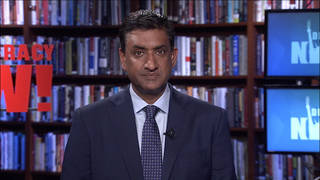
The Trump administration is facing four lawsuits over the formation of the so-called Department of Government Efficiency, or DOGE, a new government advisory committee headed by the world’s richest man, Elon Musk. One of these lawsuits is being brought by the watchdog organization Public Citizen, which says DOGE fails to comply with laws on the composition and reporting duties of such bodies. “Musk’s role in this government is part of a broader convergence of corporate and government power … that doesn’t really have a parallel in American history,” says Public Citizen co-president Robert Weissman, who calls it “profoundly dangerous.”
More from this Interview
Transcript
AMY GOODMAN: This is Democracy Now!, democracynow.org, “War, Peace and the Presidency.” I’m Amy Goodman, with Juan González.
The Trump administration is facing four lawsuits — so far — over its formation of DOGE, the Department of Government Efficiency, a new initiative headed by the world’s richest man, Elon Musk, who spent over a quarter of a billion dollars to help Trump win in November. Trump initially named former Republican presidential candidate Vivek Ramaswamy to be Musk’s co-chair, but Ramaswamy has announced he’s leaving the role to run for governor of Ohio. There are reports Musk pushed for Ramaswamy to be ousted from his role. The New York Times reports Musk is likely to be given office space inside the West Wing of the White House, even though DOGE is not an official government department. One of the lawsuits was filed by Public Citizen along with the American Federation of Government Employees and the State Democracy Defenders Fund.
We’re joined now by Robert Weissman, co-president of Public Citizen.
Rob, if you can start off by just talking about why Public Citizen has joined others in suing over DOGE? And explain even the significance of the word ”DOGE.”
ROBERT WEISSMAN: Hey, Amy and Juan. It’s great to be with you.
We sued over this new thing, which is really an advisory committee, called DOGE — it’s not a government department — to force it to comply with the law. Advisory committees have to follow certain procedures under federal law. They have to have balanced representation. They had to have open meetings, have a charter, be subject to open records law, and so on. There’s no sign that this DOGE is doing any of those things.
The term ”DOGE” refers to a meme coin or cryptocurrency that Elon Musk is a fan of. So it’s a little bit of a joke, but the joke’s on all of us. What DOGE is about is empowering Elon Musk, the world’s richest human being, to make recommendations and really drive policymaking in the Trump administration to roll back regulations, the rules that give us clean air, clean water, safe food, fair workplaces and more, to benefit corporations, and to drive a libertarian extremist agenda of cutting government spending, primarily on programs to help the poor and vulnerable, including nutrition assistance and Medicaid.
JUAN GONZÁLEZ: And, Robert Weissman, Public Citizen came up with its own cost-cutting report titled ”DOGE Delusions.” Could you talk about what you’re recommending in terms of cost cutting in government?
ROBERT WEISSMAN: Yeah. Well, of course, first off, efficiency is not a primary value. The first question is what the government ought to be doing. But we said, “OK, you’re interested in saving money. That’s what you mean by 'efficiency.' We’ll play that game. What could the government do to be efficient, not just ideologically driven, not just how to drive corporate profits?” And we came up with $500 billion in pretty easy savings, $500 billion every year. In Washington, that counts for $5 trillion, because we count in 10-year increments. We could save $200 billion if we dealt with excessive drug pricing. Some of that would help taxpayers. Some of it would help consumers. We could save $100 billion every year, or more, by ending privatized Medicare, which is a ripoff of the Medicare system. We could easily cut $200 billion from the Defense Department, the Pentagon budget. So, altogether, real quick, $500 billion. More money to be saved by cutting subsidies for oil and gas companies, and on and on.
Then we said, “Well, efficiency doesn’t just mean saving money. It should mean raising money efficiently, as well.” And it would be easy to raise an additional $500 billion, against the baseline of the current Trump tax cuts, by raising taxes on the rich and corporations. So, now we’re talking about a trillion dollars every year.
What should we do with that money? Well, efficiency should also mean making smart public investments. The programs that Musk is targeting — food stamps, early education interventions and the like — those pay back. We should be doing more of those things, because even in dollars-and-cents terms, even if you don’t care about real human beings, just in dollar-and-cents terms, they pay back. And the most important public investment we can make, if we’re just worried about dollars and cents, is making deep and profound investments to address the climate crisis, to reduce the harm we’re going to face, and to mitigate the damage that is now going to be unavoidable.
JUAN GONZÁLEZ: And you talk about Musk, who’s been tapped to head this advisory committee. What about the built-in conflicts of interest, given all the businesses that Musk has that do — that depend on the federal government?
ROBERT WEISSMAN: Yeah, they’re profound and without parallel. And in fact, I think Musk’s role in this government is part of a broader convergence of corporate and government power, corporate and state power, that doesn’t really have a parallel in American history, certainly not in the last 100 years. Profoundly dangerous.
But when it comes to Musk himself, because he’s involved in so many businesses, he has really important interests before huge portions of the government. For example, he wants Twitter, X, to become a payment transmitter. That’s like Apple Pay. If it does so, it would be regulated by the Consumer Financial Protection Bureau. Musk has called for the elimination of that bureau. He’s called for the elimination of the agency that would regulate his company. He has huge business with the Department of Defense through Starlink. He has huge business at NASA, where he’s helped install a buddy to run the agency and is competing with an Amazon-affiliated corporation. He would rather win that competition and have Amazon and Jeff Bezos eliminated from the competition. He is facing significant enforcement actions from the Securities and Exchange Commission. He’ll have the ability to influence that. He’s got big problems at Tesla with enforcement of auto safety rules against Tesla’s self-driving vehicles. And on and on and on. And he’s in position now, making recommendations throughout the government to advance his own business interests. And, of course, there’s every reason to assume he’s going to do exactly that.
AMY GOODMAN: Now, Rob Weissman, you and your co-president of Public Citizen asked to be on the advisory committee?
ROBERT WEISSMAN: Right. So, advisory committees are governed by something called the Federal Advisory Committee Act, FACA. And FACA says that advisory committees have to be fair and balanced. Well, when this so-called DOGE was started, it had two members: Musk and Vivek Ramaswamy, two billionaires. Our position is — we think, not controversially — two billionaires does not make a balanced committee. So we recommended ourselves, as experts and advocates for consumers in the public interest, to offer some balance. We haven’t received a response. But the failure of the committee to provide balance is one of the bases of our lawsuit.
AMY GOODMAN: Why, Rob Weissman, do you believe that President Trump issued one of his executive orders against EVs, when, of course, you’ve got Musk, who is the head of Tesla?
ROBERT WEISSMAN: Well, I think the core — I mean, there’s a few reasons. The primary reason is that part of the Trump agenda is to race towards climate apocalypse, to double down on oil, gas and even coal development, exploitation and use, and to move away from the advances we’ve made in renewable energy. Electric cars, obviously, an important shift away from oil and gas and towards electricity powered by the sun and wind. The EV program that Biden adopted and helped push through as part of the Inflation Reduction Act was singularly important in helping drive the move towards electric cars. And it’s Trump’s agenda to do away with all that.
Of course, Musk is in the business of selling electric cars, so there’s reason to say, “Well, does this hurt Musk?” According to Musk himself, it might cause him some pain, but it will cost his competitors in the business more pain. So, at the end of the day, it seems, he gets competitive advantage out of this move.











Media Options